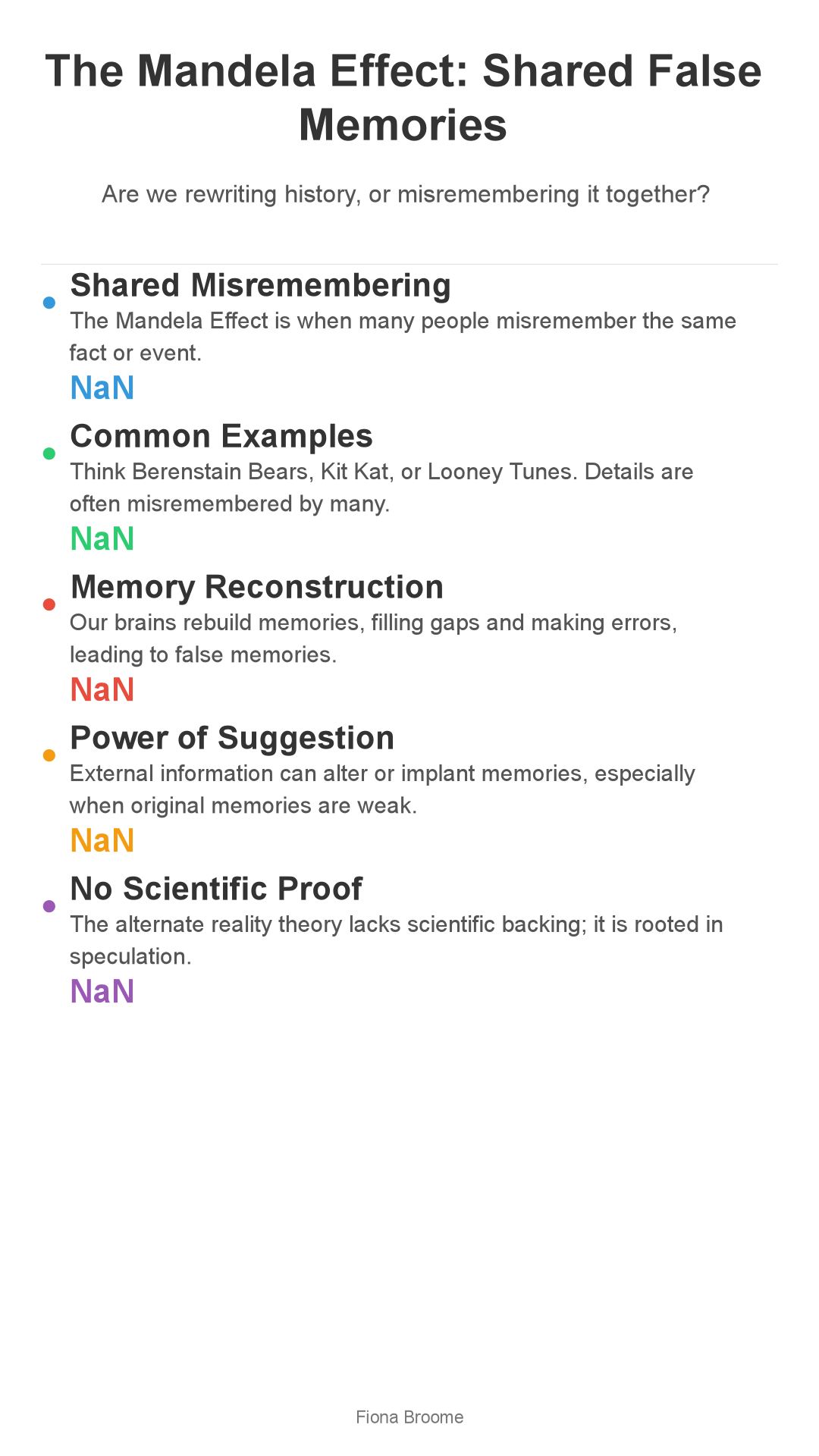
Dive headfirst into the strange and unsettling world of the Mandela Effect! Are shared false memorie
Ever felt absolutely CERTAIN about something, only to discover you were completely wrong – and millions of others felt the same way? Hit that like button and subscribe for more explorations into the internet’s mysteries! Remember the Berenstain Bears? Was it “Berenstain” or “Berenstein”? Prepare to question reality as we delve into the mind-bending Mandela Effect!
Prepare to have your perceptions challenged! We’re plunging headfirst into the strange world of the Mandela Effect, a realm of shared false memories that can shake your sense of reality.
Is it evidence of a collective memory rewrite, or simply a mass delusion amplified by the internet?
Defining the Mandela Effect and Common Examples
What is the Mandela Effect?
The term “Mandela Effect” originated with paranormal researcher Fiona Broome, who vividly (and incorrectly) remembered Nelson Mandela dying in prison in the 1980s. She soon discovered countless others shared this false recollection.
Thus, the Mandela Effect refers to a phenomenon where a significant number of people misremember the *same* fact or event. It’s not mere forgetfulness; it’s a shared, incorrect memory that defies individual explanation.
Popular Examples of the Mandela Effect
Prepare to descend down the rabbit hole! Here are some of the most frequently cited examples that fuel the Mandela Effect phenomenon:
- The Berenstain/Berenstein Bears: Perhaps the most iconic example. Many distinctly remember the beloved children’s book series being spelled “Berenstein Bears,” only to be confronted with the reality of “Berenstain Bears.
“
- Looney Toons/Looney Tunes: Another classic source of confusion. Was it “Toons,” implying cartoon characters, or “Tunes,” referring to the music?
- Kit Kat Hyphen: Picture the Kit Kat logo in your mind. Is there a hyphen between “Kit” and “Kat”? Surprisingly, there isn’t!
These examples, and countless others, have ignited passionate debates and fueled wild speculation across the internet.

A collage of different Mandela Effect examples, including the Berenstain Bears books, the Kit Kat logo, and a quote from Snow White. The Scale of the Phenomenon
The sheer scale of the Mandela Effect is what makes it so captivating. It’s not just a handful of individuals misremembering; it’s *millions* sharing the same inaccurate recollection.
This widespread phenomenon is what gives rise to the more extreme theories, such as the notion that our reality has somehow been altered or shifted.
Psychological Explanations for the Mandela Effect
False Memory: The Reconstructive Nature of Memory
The most widely accepted explanation for the Mandela Effect centers on the inherent fallibility of human memory. Memory isn’t a perfect recording device; it’s a constantly evolving reconstruction.
Each time we recall a memory, we essentially rebuild it from fragments. This process is susceptible to errors, distortions, and external influences. We unconsciously fill in the gaps, sometimes incorrectly, leading to the creation of false memories.
Confabulation: Filling in the Gaps
Confabulation is a psychological phenomenon where individuals unintentionally create false memories to bridge gaps in their recollection. It’s not deliberate deception; rather, it’s the brain’s attempt to make sense of incomplete information.
For instance, someone might misremember a detail about a childhood vacation and unknowingly fabricate a new, inaccurate memory to complete the narrative.
Suggestibility: External Influence on Memory
Our memories are remarkably susceptible to suggestion. External information, such as leading questions, misleading images, or simply hearing someone else’s false recollection, can alter existing memories or even implant entirely new ones.
This is particularly true when the original memory is weak or vague. The power of suggestion is a crucial factor in understanding how the Mandela Effect spreads and solidifies within communities.
The “Collective Memory Rewrite” and Alternate Reality Theories
The Appeal of the Alternate Reality Explanation
Let’s face it: the notion that our memories are being collectively rewritten is far more thrilling than simply acknowledging the imperfections of our brains.
The alternate reality explanation offers a convenient, though unsubstantiated, answer to the widespread discrepancies of the Mandela Effect. It posits that we’ve somehow crossed over from one reality to another, where certain details differ.
Multiverse Theory and Quantum Physics: Misused Concepts
Advocates of the “collective memory rewrite” often invoke concepts from multiverse theory and quantum physics to bolster their arguments.
They might suggest that parallel universes exist and that we’re occasionally experiencing “bleed-through” from one to another, resulting in these memory discrepancies.
However, it’s vital to recognize that these are complex scientific theories that are frequently misinterpreted and misapplied to justify pseudoscientific beliefs.
Just because something *sounds* scientific doesn’t automatically make it *is* scientific.
Lack of Scientific Evidence
Despite its allure, the “collective memory rewrite” theory lacks any credible scientific backing. There’s no empirical evidence to support the existence of alternate realities or the ability to collectively alter memories.
While the idea is intriguing, it remains firmly rooted in the realm of pseudoscience. It’s crucial to approach such claims with healthy skepticism and rely on evidence-based explanations.
The Power of Suggestion and Online Communities
How Online Forums Amplify the Mandela Effect
The internet has played a pivotal role in popularizing and amplifying the Mandela Effect. Online forums and communities provide a platform for individuals to share their experiences, compare notes, and reinforce each other’s false memories.
These echo chambers can foster a sense of validation and solidify the belief that something truly extraordinary is occurring.
Confirmation Bias: Seeking Out Supporting Information
Confirmation bias is a cognitive bias that predisposes us to seek out information that confirms our pre-existing beliefs while ignoring information that contradicts them.
In the context of the Mandela Effect, this means that individuals who believe in the “collective memory rewrite” are more likely to search for and share examples that support their theory, while dismissing or downplaying evidence that suggests otherwise.
The Role of Social Influence
Social influence exerts a powerful force that can shape our beliefs and behaviors. When we observe others confidently expressing a particular belief, we’re more inclined to adopt that belief ourselves, even if we harbor doubts.
This is especially prevalent in online communities, where social pressure can be intense.
So, after this deep dive into this bizarre phenomenon, we want to know: what’s your take? Is the Mandela Effect simply a quirk of human memory, or is there something more mysterious at play? Share your thoughts and personal experiences in the comments below!
Eager to explore more mind-bending topics? Subscribe to our channel for weekly doses of weird science, internet rabbit holes, and pop culture oddities. Don’t forget to click that bell icon to get notified of new videos!

Infographic: Key Points from this Article Enjoyed this? Check out our YouTube channel for video versions!
Enjoyed this? Check out our YouTube channel for video versions!
About The Author



